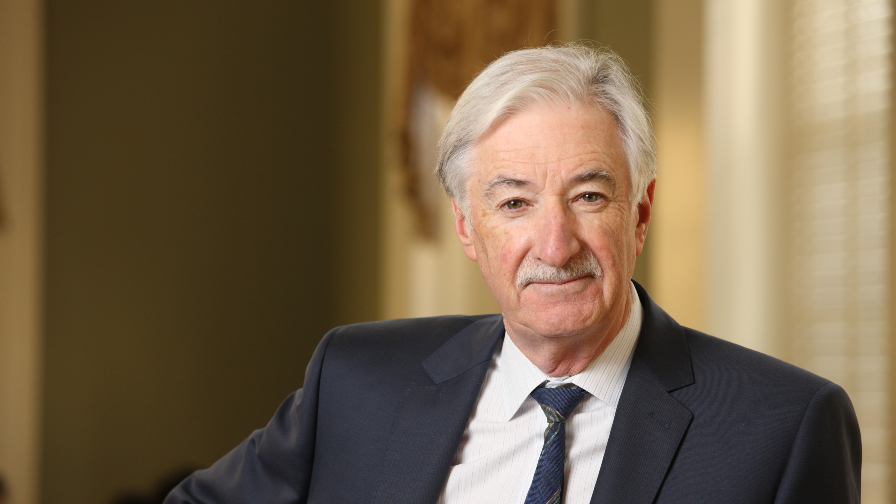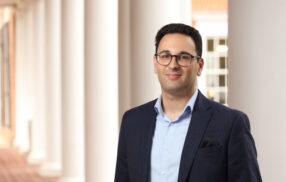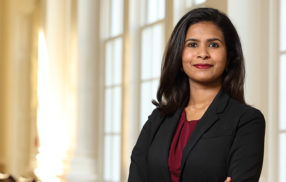
UVA Darden’s Authority on Marketing Metrics to Retire After Nearly 40 Years
By Dave Hendrick
University of Virginia Darden School of Business Professor Paul Farris’ first marketing job was in Hamburg, Germany, where he served as a brand manager for Rama margarine, then the world’s largest brand of butter alternative.
As Farris recalled, his manager at the time performed “marketing with a micrometer,” with every item analyzed, tested and reviewed. The experience foreshadowed a key component of the Darden professor’s career, with Farris becoming a sought-after expert on metrics and measurements, authoring a host of well-received books on the subject, including multiple editions of Marketing Metrics: The Definitive Guide to Measuring Marketing Performance.
After his stint in Germany, which also included launching a group of low-calorie food products, Farris enrolled in a doctoral program at Harvard, thinking the additional academic bona fides might lead to a career in consulting.
“That’s not the way it worked out,” said Farris, who will retire from the Darden School at the conclusion of the 2018-19 academic year after nearly 40 years of service.
Instead, Farris began teaching at Harvard. In one year teaching marketing cases, he said he learned more marketing than in the entirety of his doctoral program
“There’s something about marketing cases that gives you an artificial form of experience,” Farris said. “If you engage, cases teach you more than you even understand at the time. I was in love with the case method.”
So, when the other case-centric MBA program came calling, Farris traveled to Darden for a week to visit and never left.
“We were charmed by the people we met and the Charlottesville community,” Farris said. “My wife and I had just gotten married. We were planning on having children, and we just thought that Charlottesville would be a wonderful place to bring up kids. And that turned out to be true.”
In his decades at the School, Farris saw his area of interest change dramatically, with an entirely new category of marketing metrics and practices ushered in by the popular adoption of the internet in the mid-1990s.
Farris said a fortuitously timed Executive Education engagement helped immerse the School in the then-nascent space.
“We had a wonderful opportunity right at the very beginning of the internet becoming a commercial institution to teach a series of executive programs for PwC senior consultants,” Farris said. “We taught that program several times over three years, and that gave us the excuse, access and motivation to really understand what was happening, write lots of cases and talk to senior managers on the most current developments in the internet at that time.”
By the time the initial internet boom burst, the School had built enough collateral and cases to remain abreast of the new medium at a critical time.
The embrace of business practice, with the ability to connect with senior leaders through executive education or consulting projects or serving on boards, has remained an appealing facet of the Darden experience for Farris.
“At some other places, the nitty gritty of practice is regarded as noise as far as applying the more abstract theory of management,” Farris said. “For me, that nitty gritty is the foundation.”
Farris pointed to the current Darden faculty as evidence that the commitment to practical applicability is as strong as ever at the School, with a group of top professors who remain as committed to understanding and influencing management practice as publishing in academic journals.
Farris said he looks forward to digging deeper on a few projects in retirement while he still has the energy and opportunity, including finishing a book on distribution channels. As he has done throughout his career, Farris and co-author Kusum Ailawadi (Ph.D. ’91) are synthesizing the state of practice while looking ahead to what’s next.
“The idea is that companies increasingly have a multiple-channel approach to go to market and they have to coordinate those approaches so they complement and don’t just cannibalize each other,” said Farris. “So the book is trying to separate what is enduring and classic in terms of distribution principles from things that are new and different and are going to change the way we think about channels.”
The University of Virginia Darden School of Business prepares responsible global leaders through unparalleled transformational learning experiences. Darden’s graduate degree programs (MBA, MSBA and Ph.D.) and Executive Education & Lifelong Learning programs offered by the Darden School Foundation set the stage for a lifetime of career advancement and impact. Darden’s top-ranked faculty, renowned for teaching excellence, inspires and shapes modern business leadership worldwide through research, thought leadership and business publishing. Darden has Grounds in Charlottesville, Virginia, and the Washington, D.C., area and a global community that includes 18,000 alumni in 90 countries. Darden was established in 1955 at the University of Virginia, a top public university founded by Thomas Jefferson in 1819 in Charlottesville, Virginia.
Press Contact
Molly Mitchell
Senior Associate Director, Editorial and Media Relations
Darden School of Business
University of Virginia
MitchellM@darden.virginia.edu







